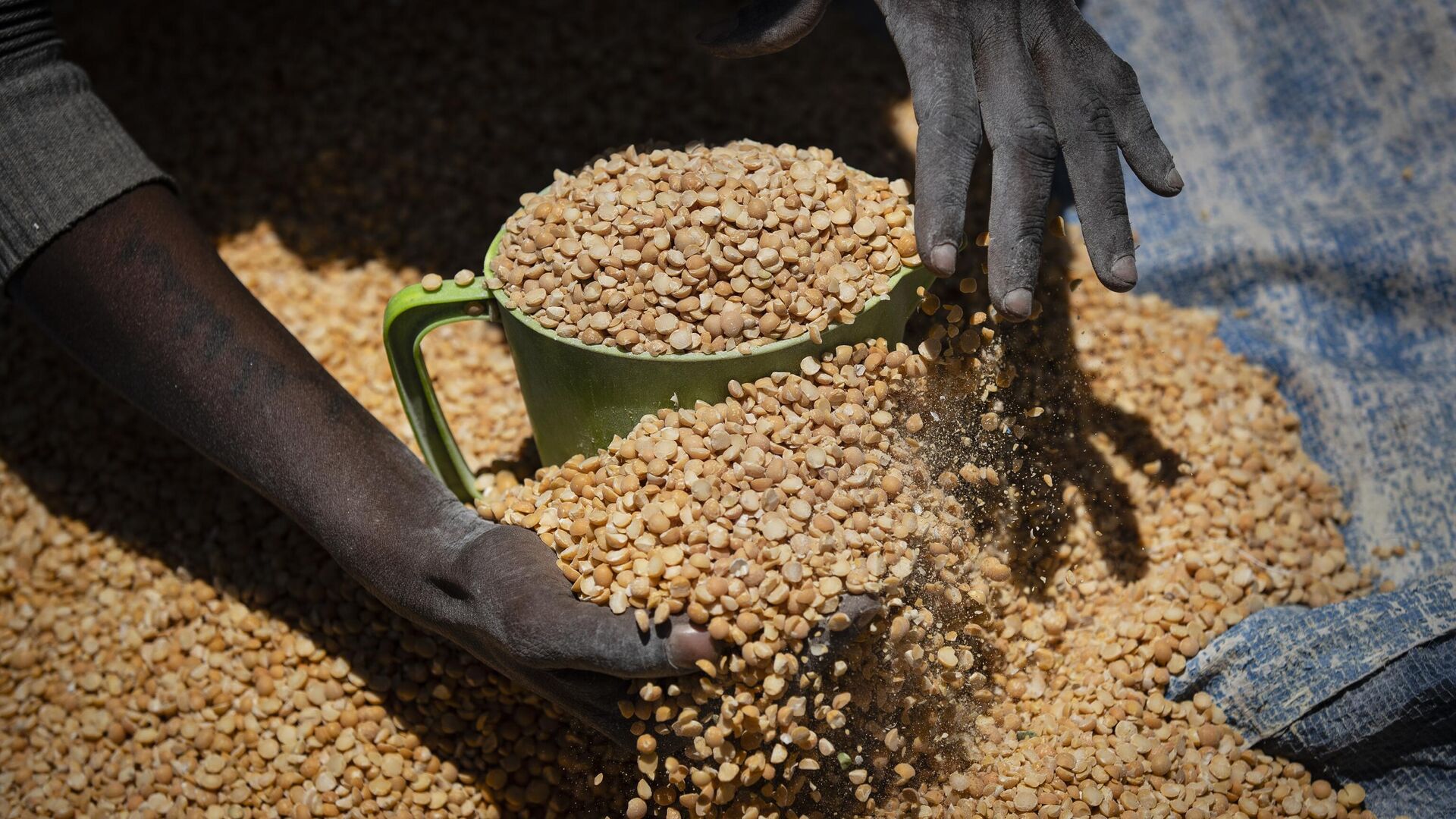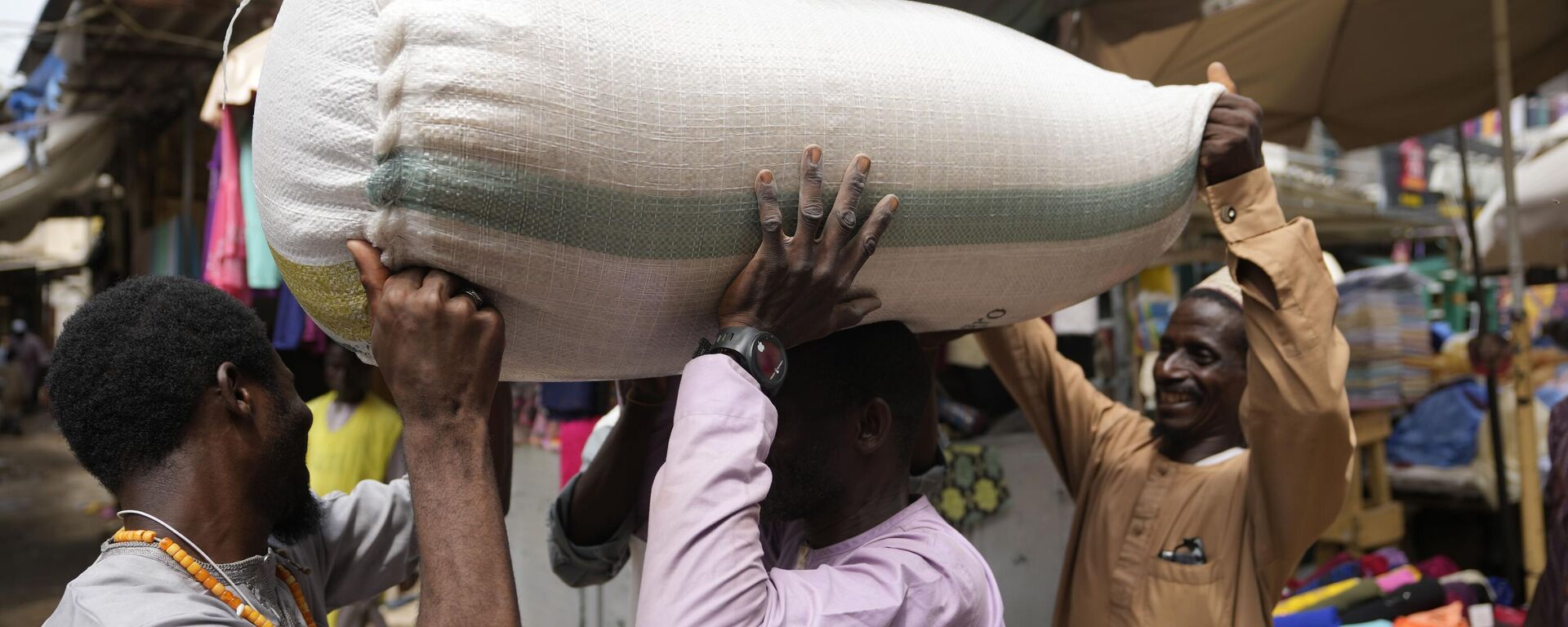https://en.sputniknews.africa/20230923/africa-to-end-food-insecurity-in-five-years-afdb-president-1062293415.html
Africa Could End Food Insecurity in Five Years: AfDB President
Africa Could End Food Insecurity in Five Years: AfDB President
Sputnik Africa
According to the estimates of the 2022 Global Report on Food Crises,140 million people in Africa face acute food insecurity. As the effects of climate change... 23.09.2023, Sputnik Africa
2023-09-23T11:37+0200
2023-09-23T11:37+0200
2023-09-23T11:55+0200
sub-saharan africa
african development bank (afdb)
world food crisis
food security
world food programme (wfp)
economy
finance
https://cdn1.img.sputniknews.africa/img/07e7/09/17/1062293849_0:160:3072:1888_1920x0_80_0_0_d432e8b5d92dd84a0fc8a01c777ce47f.jpg
Africa will be able to overcome food insecurity within the next five years as the continent has enough financial and technological resources to address the issue, said African Development Bank (AfDB) President Akinwumi Adesina on the sidelines of the UN General Assembly in New York.According to the AfDB chief, various programs supported by the bank in more than 30 African countries have helped produce about $12 billion worth of food, and the organization's $25 billion goal is "well on track."Commenting on these programs, Adesina pointed in particular to the creation of special agro-industrial processing zones, which in Nigeria alone could be expanded from eight states to 35. These zones are rural areas where infrastructure is being developed for the establishment of food and agricultural businesses. He noted that 27 more states in Nigeria asked the bank for continued support in this area.Adesina went on to say that he expects the International Monetary Fund's executive board to advance plans to allocate $100 billion in loans to vulnerable countries through multilateral development banks before governments gather in Dubai in late November for global climate talks.According to the AfDB, food security remains a critical development issue for Africa, with many nations facing high food costs and periodic food shortages due to climate change, humanitarian crises, and conflicts.Earlier, the bank's head reiterated that "food aid cannot feed Africa," stressing that the continent "does not need bowls in hand, but seeds in the ground, and mechanical harvesters to harvest bountiful food produced locally."In 2022, the board of the African Development Bank Group approved a $1.5 billion fund to help African countries avert a food crisis. The African Emergency Food Production Facility is expected to provide 20 million African smallholder farmers with certified seeds, increase access to fertilizers, and enable them to rapidly produce 38 tonnes of food. According to the bank, the project will increase food production by $12 billion in just two years.
https://en.sputniknews.africa/20230801/nigerian-president-orders-release-of-over-200000-tonnes-of-grain-to-citizens-1060969072.html
Sputnik Africa
feedback@sputniknews.com
+74956456601
MIA „Rossiya Segodnya“
2023
News
en_EN
Sputnik Africa
feedback@sputniknews.com
+74956456601
MIA „Rossiya Segodnya“
Sputnik Africa
feedback@sputniknews.com
+74956456601
MIA „Rossiya Segodnya“
african development bank (afdb), world food crisis, food security , world food programme (wfp), economy, finance
african development bank (afdb), world food crisis, food security , world food programme (wfp), economy, finance
Africa Could End Food Insecurity in Five Years: AfDB President
11:37 23.09.2023 (Updated: 11:55 23.09.2023) According to the estimates of the 2022 Global Report on Food Crises,140 million people in Africa face acute food insecurity. As the effects of climate change continue to intensify, a food and fuel crisis in sub-Saharan Africa is exacerbated by multiple global shocks, the lingering effects of the COVID-19 pandemic, inflation and rising debts.
Africa will be able to overcome food
insecurity within the next five years as the continent has enough financial and technological resources to address the issue, said African Development Bank (AfDB) President Akinwumi Adesina on the sidelines of the UN General Assembly in New York.
"As far as I'm concerned, we shouldn't be talking about food security in Africa more than five years from now. There's no reason for it," he told media, adding: "We have the technology and the financing to do it at scale."
According to the AfDB chief, various programs supported by the bank in more than 30 African countries have helped
produce about $12 billion worth of food, and the organization's $25 billion goal is "well on track."
Commenting on these programs, Adesina pointed in particular to the creation of special agro-industrial processing zones, which in
Nigeria alone could be expanded from eight states to 35. These zones are rural areas where infrastructure is being developed for the establishment of food and agricultural businesses. He noted that 27 more states in Nigeria asked the bank for continued support in this area.
Adesina went on to say that he expects the International Monetary Fund's executive board to advance plans to allocate $100 billion in loans to vulnerable countries through multilateral development banks before governments gather in Dubai in late November for global climate talks.
"This is the way for us to crack how to get more resources, at scale," he said, adding: "For the African Development Bank, a $20 billion allocation channeled into us, automatically becomes up to $80 billion for Africa."
According to the AfDB, food security remains a critical development issue for Africa, with many nations
facing high food costs and periodic food shortages due to climate change, humanitarian crises, and conflicts.
Earlier, the bank's head reiterated that "food aid cannot feed Africa," stressing that the continent "does not need bowls in hand, but seeds in the ground, and mechanical harvesters to harvest bountiful food produced locally."
In 2022, the board of the
African Development Bank Group approved a $1.5 billion fund to help African countries avert a food crisis. The African Emergency Food Production Facility is expected to provide 20 million African smallholder farmers with certified seeds, increase access to fertilizers, and enable them to rapidly produce 38 tonnes of food. According to the bank, the project will increase food production by $12 billion in just two years.


